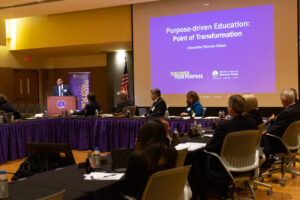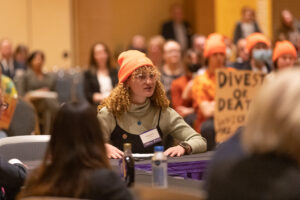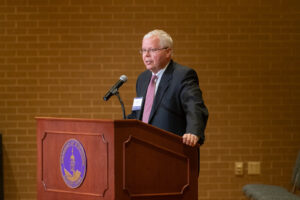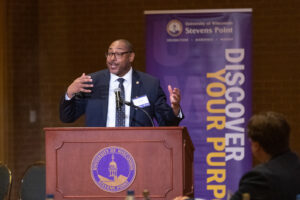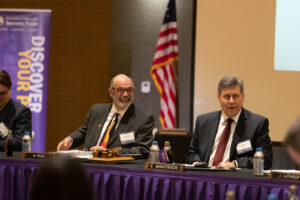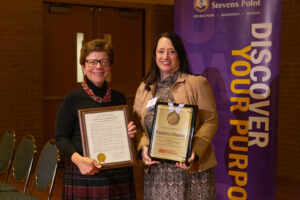STEVENS POINT, Wis. – Five students representing five universities around the University of Wisconsin System came before the Board of Regents Thursday with passionate pleas for greater and more coordinated engagement in sustainability efforts.
The student panel was a focal point of a larger presentation on UW System’s sustainability initiatives.
“We need to help people see this is both possible and worth it,” said UW-Madison’s Eliza Lindley. “We know that paralysis in the face of fears is not an option.”
UW-Milwaukee student Allyn Lottouzee called on the UW System to be proactive rather than reactive in addressing sustainability efforts, giving sustainability a more prominent presence at both the campus and System level.
Abrina Leonhard from UW-Stout called herself an agent of change. She told Regents there will always be people who point out every challenge, “but I ask you to remember feeling grateful for the beautiful place we call home. We must work together to strive for excellence even when we face failure.”
“My biggest concern is that our sustainability efforts have not left the planning stage,” said Maddie Loeffler of UW-Eau Claire. “If there’s no action behind the words, they lose their meaning.” She urged the Board to consider how students are impacted by widespread inaction or under-action.
Molly McGuire, an Illinois native who chose to attend UW-Stevens Point because of its College of Natural Resources, called for the Board to encourage the UW to look at divestment from fossil fuels. “Be bold, question norms, and be open-minded,” she said. “It’s time for the UW System to put sustainability at the forefront.”
Dave Barbier, sustainability coordinator at UW-Stevens Point, told Regents, “Students are already leading our campuses on these efforts and want to see their efforts reciprocated by the System and their universities.”
Barbier added that commitment to sustainability impacts a broad range of areas including student enrollment and retention, mental health, and institutional decisions.
According to a 2021 survey by The Princeton Review, he said, 78% of students nationwide say a university’s environmental commitment contributes “somewhat, very much, or strongly” to their school choice. That’s up from 63% in 2018.
He also pointed to an American Psychology Association report that 45% of teens and young adults say climate anxiety is affecting their daily lives and decisions on starting a family or buying a home.
Climate issues have also directly impacted UW institutions. UW-Milwaukee, for example, sustained $1.8 million in flood damage claims between 2010–2020. In 2014, UW-Platteville had $18.6 million in tornado damage.
Regent President Edmund Manydeeds III said the students “just presented evidence with witnesses who want to do something to help this planet, this state, this campus … and they’re right. The verdict has to be we’re going to do something about it.”
Regent Mike Jones called the students’ presentation both persuasive and thoughtful. “What are the next steps?” he asked. “It’s clear we can’t have this be a one-off presentation.”
Kate Nelson, UW-Milwaukee’s Director of Sustainability, told Regents the UW System generally is “trending in the right direction,” with overall energy consumption down 11%. The challenge, she said, is “in order to save money, efficiency measures have to keep pace with rising costs.” Natural gas prices, for example, are expected to rise 28% by 2030.
UW-Milwaukee Chancellor Mark Mone called for the development of a strategic framework for sustainability across multiple fronts. “We can’t do more absent additional help,” he said.
UW-Madison Chancellor Becky Blank noted her campus’s longstanding commitment to sustainability efforts, but also offered the reminder that, under state law, universities cannot intervene in the divestment decisions of their foundations. “Where do I have leverage? It is education and research and making sure I’m running a sustainable campus,” she said.
Regent President Manydeeds told the students to “keep checking in on us. We need to be checked on.”
UW System’s next president Jay Rothman speaks
Incoming UW System President Jay Rothman attended Thursday’s meeting and briefly addressed the Board.
Rothman told Regents he’s been spending significant time listening to people both within the system and outside the system and learning about the challenges and the opportunities the University faces.
“It is heartwarming to continually hear so many stories about the transformative power campuses have on lives of students,” said Rothman, who officially starts in the new role on June 1. “These are the impacts that dramatically impact the trajectory of so many people in Wisconsin and beyond.”
“I have also been reassured hearing the details about the extraordinary work being done across the system and the broad-based commitment to student-centered education. This is truly exceptional. Given that foundation, I look forward to the future with great optimism and great enthusiasm,” he said.
UW-Stevens Point helps students find purpose
Leading the host campus presentation, UW-Stevens Point Chancellor Thomas Gibson told Regents that the university is dedicated to a purpose-driven education that transforms students. He said this includes inclusive pedagogy, impactful research, critical thinking, and applied learning. Students are transformed by what they learn and how they learn it, he said.
“Students come to UW-Stevens Point to discover their purpose,” Gibson said, adding that some come with a clear purpose already in mind, while others discover that purpose in the course of their college experience.
Last fall, UW-Stevens Point became the first campus in the state to build critical thinking into the general education program for first-year students. By introducing a common framework early in students’ college journeys, students can easily see how critical thinking skills are developed across the disciplines throughout their education. Critical thinking has also been identified as one of the most important skills sought by employers.
Research further defines students’ transformational experience. Many students are involved in undergraduate research as early as their first year on campus, Gibson said.
UW-Stevens Point consistently ranks first or second among comprehensive UW universities in extramural research and public service grants, with a total of $6.7 million in Fiscal Year 2021. This is key to funding critical research in a range of areas important to Wisconsin, such as aquaculture, water quality, chronic wasting disease, forestry, and strategies to treat invasive pests and plants.
Approximately 75% of undergraduates at UW-Stevens Point participate in internships. Gibson said. Students gain valuable experience and skills while meeting the critical needs of regional employers. Applied learning also includes faculty-mentored activities such as art exhibits, musical performances, theatre productions and student media in the College of Fine Arts and Communication. It is the only college in the state to hold national accreditation in all arts programs: Art and Design, Dance, Interior Architecture, Music, and Theatre.
Sustainability is a hallmark of UW-Stevens Point’s commitment to purpose-driven education. UWSP is a leader not just in the environmental sense, Gibson said.
“We led the way 75 years ago with the first conservation education major. We have a 50-plus year history and international reputation in natural resource management. But we go deeper than that,” he said. “We are well on our way to leading across the spectrum of economic sustainability, climate change, social justice, health care, and gender equality. Sustainability is the lens that many of our students will use to guide their decision-making long after they graduate and become global citizens.”
UW-Stevens Point will offer a new major in community sustainability this fall, integrating the social, ethical, and political dimensions of environmental sciences. The doctoral program in educational sustainability is the only one of its kind in the country.
Inclusive excellence is another thread woven throughout curriculum, activities, and campus communities. “My goal is to foster a learning community committed to equity, diversity, and inclusion,” Gibson said. The Inclusive Teaching Fellows Program, a “grow your own” model for hiring and retaining faculty of color, is recruiting its first Fellows by fall.
The impact of a UW-Stevens Point education transforms not only our students, but also our communities, state, and nation, the chancellor said. As students and alumni, Pointers serve and enrich their communities as active, engaged citizens, entrepreneurs, artists, and leaders. “They carry out the Wisconsin Idea, bringing resources and expertise to every corner of the state,” Gibson said.
Regent President’s Report
In his report to the Board, Regent President Manydeeds provided updates on the current UW-Madison chancellor search. Noting that the national search had been launched in January, he reported the 21-member Search & Screen Committee chaired by Regent Vice President Karen Walsh had held a series of listening sessions with UW-Madison faculty, academic and university staff, students, alumni, and community members to hear their views on the qualities and characteristics that would be important for next Chancellor.
Manydeeds reported that earlier this week, the committee reviewed applicants and selected the semifinalist candidates who will be invited to interviews. Following those interviews, he said, the Search & Screen Committee will forward a slate of recommended candidates to a Special Regent Committee, which will include Regents Amy Bogost, Mike Jones, Tracey Klein, John Miller, Walsh, and himself as chair.
“I anticipate the Special Regent Committee will announce finalist candidates later this month, with on-site campus visits to be scheduled in early May,” Manydeeds said.
He also provided a brief report on the upcoming launch of two additional chancellor searches at UW-Platteville and UW-Whitewater.
Current UW-Platteville Chancellor Dennis Shields has accepted a position as President of the Southern University System and Chancellor of Southern University and A&M College in Baton Rouge. Manydeeds told Regents that President Falbo has just named UW-Platteville Provost and Vice Chancellor of Academic Affairs Tammy Evetovich as interim Chancellor, effective June 1.
At UW-Whitewater, interim Chancellor Jim Henderson announced earlier this week that he was stepping down. UW-Whitewater Provost and Vice Chancellor for Academic Affairs John Chenoweth was named interim Chancellor by Falbo, effectively immediately.
Manydeeds told Regents that the process of identifying members of the search committees for both the UW-Whitewater and UW-Platteville chancellor searches would occur in the next few weeks, and it’s expected the actual search would officially launch by the end of the month. The goal is to complete these search processes by February 2023.
Manydeeds also updated the Board on the Special Regent Committee on Governance Issues. While the committee’s work was temporarily suspended in the final stages of the presidential search process, Manydeeds said he’s asked the Board Office to identify additional meetings for this committee in the next few months.
Turning to commencements, Manydeeds noted that about 23,000 students are expected to receive their University of Wisconsin diplomas next month. On behalf of the Board, Manydeeds offered congratulations to the Class of 2022. One of those graduates, he added, will be Regent Corey Saffold, who will earn a degree in criminology from UW-Whitewater.
The April meeting will be the final meeting for Saffold, as well as Regents Andrew S. Petersen and Michael M. Grebe, whose seven-year terms are scheduled to end May 1. The contributions of all three regents will be officially recognized by the board at a later date.
UW System President’s Report
Interim President Falbo opened his report by thanking Anny Morrobel-Sosa, UW System’s Vice President for Academic and Student Affairs, for “her service to the UW System overall, to our faculty and staff, and most of all, to our students.” Morrobel-Sosa will resign from the UW System effective May 31.
Morrobel-Sosa, who has been with UW since 2019, helped to renew a vision of the Wisconsin Idea for the 21st century by focusing on access, flexibility, relevance, and lifelong learning, Falbo said. “At the core, she believes all our students should be prepared for the challenges and opportunities of life and work in an increasingly diverse state, nation, and world.”
Falbo then provided Regents with an overview of the ongoing presidential transition process, in advance of Jay Rothman’s arrival on June 1.
“I firmly believe that the success of the UW System is predicated on the success of our universities and our students. For that reason, I have been relying heavily on the chancellors for advice on how President Rothman and I can best serve the UW System going forward,” he said.
Falbo said a transition team has been formed to help with prioritizing the work of UW System Administration to effectively serve campuses and students, while also assisting the Board in meeting its fiduciary duties.
The transition team includes Chancellors Debbie Ford of UW-Parkside, Katherine Frank of UW-Stout, Thomas Gibson of UW-Stevens Point, and Joe Gow of UW-La Crosse, as well as UW-Whitewater Vice Chancellor Artanya Wesley and interim UW System Vice President for University Relations Jeff Buhrandt. Also on the team are Regents Mike Jones, Manydeeds, Ashok Rai, and Karen Walsh.
“I have already seen these leaders work diligently, and I look forward to making great strides with this team in the coming months and leaving President Rothman in the best position to serve our campuses and our students,” Falbo said.
Falbo told Regents that the UW System, after a year’s hiatus due to the pandemic, returned to the Capitol last month for the 18th annual Research in the Rotunda event – one of the UW System’s most significant outreach events. More than 100 undergraduate students and their faculty advisers from all across the System displayed their research findings on a variety of important topics with legislators, state leaders, UW alumni, and other supporters.
“In the UW System, it’s important to us that the educational experiences we offer our students are relevant and real-world … Undergraduate research projects provide students with hands-on experience in identifying a challenge and then using innovative thinking and problem-solving skills to find solutions,” Falbo said. “No surprise, this also makes our student researchers highly sought after by employers after they graduate.”
Finally, Falbo offered congratulations to UW-Parkside Chancellor Debbie Ford who recently received the prestigious Salute to Catholic School Alumni Award in Louisville, Kentucky. The award, which was presented by the Catholic Education Foundation, recognizes individuals for their leadership and dedication to community service.
Resolution of Appreciation for Chancellor Blank
Attending her final Board meeting, UW-Madison Chancellor Rebecca Blank was recognized by the Board of Regents for her tremendous leadership and service at the helm of the UW System’s flagship for the past eight years. This summer, Blank heads south to become the 17th president and first female president of Northwestern University.
UW-Madison alumna Regent Vice President Karen Walsh presented the Board’s resolution of appreciation to Chancellor Blank.
“It’s been an honor to be on this job,” Blank said, acknowledging the outstanding faculty, staff, students, and others who make the UW-Madison a special place.
“I also say this is a job that has some elements of joy that I don’t know a single other job could have,” Blank said, noting the Babcock ice cream named after her, the marching band, and great student-athletes. “And it’s got a campus environment that can’t be beat,” Blank said. “Thanks for being such good colleagues.”
Education Committee
In her report to the Education Committee, Vice President Anny Morrobel-Sosa told Regents the UW System will receive a $5-million investment from American Recovery Plan Act (ARPA) funds to provide students better access to mental health support when need. This allocation of funds, part of Gov. Evers’ “Get Kids Ahead” initiative, will be transferred to UW System Administration and used in a competitive bid process to procure telehealth services that will fill critical gaps in currently available on-campus services.
In other business, the Education Committee:
- Approved UW-Madison’s request for a Doctor of Philosophy in Gender and Women’s Studies (GWS). The development of the program responds to the university’s strategic initiative related to excellence in research and scholarship, building on major research advances in GWS, and a growing trend of establishing Ph.D. programs in GWS at American universities. It reflects the successful Master of Art in GWS at UW-Madison and responds to student interest and trends in the discipline.
- Approved UW-Madison’s request for a Master of Science in Data Engineering, to be housed in the Department of Computer Sciences. Data engineering is concerned with the principles and practices of managing data at scale. In addition to fast-growing employment opportunities, the program also serves a specific group of students in collaboration with the U.S. Army to address critical national needs.
- Approved UW-Madison’s request for a Master of Science in Data Science, to be housed in the Statistics Department but jointly offered by the Statistics and Computer Sciences departments. The curriculum will address the emerging and rapidly growing areas of applied statistical and computer research and practices.
- Approved UW-Stout’s request for a Bachelor of Science in Cybersecurity. The program integrates curriculum from existing concentrations, certificates, and a minor in programs focused on computer and information technologies that are well-established at UW-Stout. Graduates of the program will help fill the urgent global need for cybersecurity professionals.
- Approved UW-Superior’s request for a Bachelor of Science in Business Analytics, a multi-disciplinary major that prepares students to make data-driven decisions and engage in and address complex issues in the business world. It responds to rising market demand regionally, nationally, and internationally for individuals with skills related to business analytics.
- Approved a collaborative request for new liberal arts transfer programs for the Associate of Arts and Science at Blackhawk Technical College; Fox Valley Technical College; Lakeshore Technical College; Mid-State Technical College; Moraine Park Technical College; Northeast Wisconsin Technical College; Waukesha County Technical College; and Associate of Arts at Western Technical College. Students will be guaranteed admission to a four-year institution as a transfer student and enter the UW with junior standing. This will save time toward earning the bachelor level degree, eliminating unnecessary duplication of classes and increased student debt.
- Heard a presentation by UW-Stevens Point highlighting the work of three students as examples of the innovative and diverse impact of the university locally, regionally, nationally, and internationally.
- Heard from a panel that included Senior Student Affairs Officers and two student on how students and staff navigated some of the challenges presented by the COVID pandemic, including the student athlete experience, the student leader experience, and the behavioral and mental health of students and staff.
- Heard a preliminary update on the three-year study which began in 2021 on the impact of the ACT/SAT test-optional policy approved by the Board in December 2021. UW universities began suspending ACT/SAT requirements in 2020 due to COVID-related challenges. The study is executed by the UW-Madison Student Success Through Applied Research (SSTAR) lab.
Business & Finance Committee
UW-Stevens Point Vice Chancellor for Business Affairs Pratima Gandhi led a presentation on how the university has navigated the financial challenges associated with enrollment, COVID, and other issues. Gandhi said UW-Stevens Point has addressed its structural deficit and invested in strategic priorities and expects to further improve its financial position through increased freshman enrollment and the development of new programs.
In other business, the Business & Finance Committee:
- Approved a UW System contract with Oracle America for budgeting and planning software which is currently being used at System. With the original contract expiring, this new five-year agreement will allow for its continued used until the budgeting and planning function fully transitions to the new Enterprise Resource Planning system, Workday.
- Approved UW-Milwaukee’s newly negotiated five-year agreement with Verizon Wireless, allowing the cellular provided to continue with rooftop placement of its equipment at Bolton Hall, with an increase in the license fee paid to UWM.
- Approved UW-Madison’s educational services agreement with edX, LLC, an online program management company. Under a prior agreement, UW-Madison will make noncredit offerings available to corporate and professional development lifelong learners by July of this year. In this proposal, UW-Madison will offer fully online for-credit master’s degree programs by 2024, which edX will market to its global portfolio of over 42 million learners. Under the initial 10-year, revenue-sharing agreement, UW-Madison expects $2 million to be generated annually for the School of Business.
- Approved UW-Madison’s master standard research agreement with AavantiBio, Inc., in which the School of Medicine and Public Health will explore the feasibility of using gene therapy approaches to correct a range of genetic mutations found in the heart which causes HCM, a disease that impacts up to 1 in 500 people. This is UW-Madison’s first agreement with the company, with total funding approaching $1.1 million.
- Approved UW-Madison’s master clinical trial agreement with Takeda Development Center Americas, Inc., a global pharmaceuticals company, for future research in to-be-determined clinical trials. UW-Madison has executed seven prior research and clinical trials with Takeda over the years totaling over $2.1 million.
- Approved UW-Madison’s standard research agreement with Beren Therapeutics, P.B.C., which expand an existing research program looking at a range of cardiovascular conditions. The research is being done by the Department of Animal and Dairy Sciences, and will involve the continued development of swine models to study imaging and treatment modalities for atherosclerosis.
- Approved UW-Madison’s master research agreement with Flywheel Exchange, LLC, a company that provides a research informatics program targeted at facilitating medical imagine-related research and cross-site collaboration. Under this research program, Flywheel Exchange licenses software to UW-Madison, procured with a discount, as the university provides feedback and evaluation on the software.
- Approved UW-Madison’s contractual agreement with Raytheon Technologies Corporation, a sub-awardee to a $3-million Department of Energy award to the university in 2020 to prototype a first-of-a-kind ultra-high efficiency thermal-to-electrical power conversion system. This agreement provides funding to Raytheon for year two of the project and enable the company’s continued participation.
- Approved UW-La Crosse’s purchase from Heartland Business Systems of hardware necessary to replace and upgrade the university’s wireless network, which is nearing its end of life. The $2.1 million price is part of a total $2.4 million overall cost of the project, which is an eligible use of federal HEERF funds. In separate but related action, the committee also approved an amendment adding the UW-La Crosse project to the UW System Report on Strategic Plans for Major IT Projects, which was approved by the Board in February.
- Heard a report from the State of Wisconsin Investment Board and the UW System Office of Trust Funds. For the quarterly period ending Dec. 31, Trust Fund assets totaled $759 million. The Fund’s public equity investment increased 5.6% during the quarter, while bond investments saw a marginal return, and inflation-sensitive investments returned 3.5%. For the quarter, both the Long Term Fund and the UW Fund Custom Benchmark increased in value about 4.5%.
Capital Planning & Budget Committee
The Capital Planning & Budget Committee approved UW-Madison’s request for authority to construct a 2019-21 Classroom Renovation/Instructional Technology Improvement Program project to renovate space in one of the largest lecture halls on the campus, Agricultural Hall Room 125.
The historic space was built in 1903, seats nearly 600 individuals, and has largely gone untouched since its opening. By updating the systems, finishes, and furnishings while preserving, restoring, and augmenting the historical integrity and beauty of this historical marquee lecture space, the project ensures the lecture hall will be available as an instructional space for future generations of students.
In other business, the Capital Planning & Budget Committee:
- Approved UW-Madison’s request for authority to sell 123.77 acres of agricultural land in the city of Marshfield in accordance with the Option to Purchase executed between the Board of Regents and the City of Marshfield in 2002.
- Approved UW-Madison’s request for authority to purchase approximately 70 acres of agricultural land located proximate to the Arlington Research Station (ARS) to be used for research by the College of Agriculture and Life Sciences (CALS). The purchase of additional land will almost double the number of organic acreages at ARS and allow UW-Madison to be more competitive for grant funding and produce more robust research outcomes.
- Approved UW-Madison’s request for authority to enter into a lease of approximately 23,000 square feet located at 610 N. Whitney Way, Madison, to be occupied by the Department of Family Medicine and Community Health within the School of Medicine and Public Health (DFMCH). DFMCH has expanded its service area to 17 outpatient clinical sites in Dane, Columbia, and Dodge Counties and this location will provide an easily accessible, central location.
- Approved UW-Madison’s request for authority to execute a 25-year ground lease for approximately 15 acres of land between the Board of Regents and Wisconsin Power and Light Company, to host a solar photovoltaic array on property owned by the Board near Stoughton. The opportunity to work with WP&L will provide a solar photovoltaic site for agricultural research and education and increase the visibility of renewable energy efforts on properties owned by the Board of Regents.
- Approved UW-Madison’s request to approve the conversion of fee simple ownership of property located in the 1200 block of University Avenue to a condominium containing two units; and accept the subsequent gift of the above-surface level ownership interest from the current owner. The footprint of the proposed location of the new Computer, Data, and Information Science (CDIS) building straddles parcels of land individually owned by the Board of Regents and the Wisconsin Alumni Research Foundation. City of Madison Fire Code prohibits the construction of buildings on parcels owned by different parties, so the two parcels must be combined into one through a new certified survey map.
- Approved UW Oshkosh’s request for authority to enter into a lease of approximately 12,405 square feet at 515 E. Parkway Avenue, Oshkosh, to be occupied by Head Start. UW Oshkosh is the federal grantee for the UW Oshkosh Head Start program serving 488 children across four counties. The Wilcox Head Start Center in Oshkosh will increase its square footage from 7,500 square feet to 12,405 to accommodate more classrooms and children.
- Approved UW Oshkosh’s request for authority to purchase an approximately 2.65-acre parcel of land and improvements located at 444 N. Sawyer Street, Oshkosh. This is the acquisition of a 22,237 square foot building located across the street from the UW Oshkosh Sports Complex and Titan Stadium. The building will be used as storage and indoor practice space as well as office space for the newly formed UW Oshkosh Titan Thunder marching band.
- Approved UW-Platteville’s request for payment of $185,000 Program Revenue-Cash to the City of Platteville for a Special Assessment for a sanitary sewer replacement project adjacent to the Williams Field House.
- Approved UW-Eau Claire’s request for authority to demolish Thomas and Putnam Residence Halls to prepare the site for the new Science and Health Sciences Building for an estimated demolition cost of $1,684,800 Program Revenue Cash. The new science building will be home for the Chemistry, Materials Science & Engineering, Physics & Astronomy, and Psychology programs as well as new Nursing simulation laboratories and a new Mayo Clinic research laboratory site.
- Approved UW-Milwaukee’s request for authority to construct Sandburg Hall West Tower Renovation project for an estimated total cost of $11,445,000 Existing Program Revenue Supported Borrowing. The Sandburg Hall complex provides accommodation for about 2,800 students. The renovation of west tower will include maintenance of bathrooms, bedrooms, and elevators, as well as an update of HVAC, electrical, and fire alarm systems.
- Approved UW System’s request for authority to construct nine All Agency Maintenance and Repair projects:
- At UW-Madison, structural repairs at Helen C. White Hall’s parking garage.
- Four projects at UW-Whitewater: Roofing replacements at Connor University Center, Moraine Bookstore, Fischer Hall, and Goodhue Hall; pavement, damaged curb, and gutter replacements as well as storm sewer inlet replacements/installations on Schwager Drive; and renovation of Goodhue Hall’s 3rd floor to provide overflow for student housing.
- At UW-Green Bay, upgrades to North campus’ primary and secondary electrical service.
- At UW-La Crosse, renovation of Sanford Hall, including full fire suppression system, new fire alarm and smoke detection system, and renovation of showers and bathrooms.
- At UW-Milwaukee, renovation of 13,751 GSF in Norris Hall for the relocation of the UW-Milwaukee Police Department.
- At UW-Parkside, installation of a new 2.08-megawatt solar photovoltaic array on nine acres of undeveloped land on the east end of campus.
- Heard a UW-Stevens Point presentation on “Purpose Driven Capital Investments: Reimagining the Student Experience.”
- Heard a report from the Senior Associate Vice President.
Audit Committee
The Audit Committee:
- Heard a presentation by Chief Audit Executive Lori Stortz on the annual internal audit plan including interim progress reports.
- Heard an overview by Stortz of the following reports:
- Conflicts of Interest and Outside Activity Reporting
- Payroll Continuous Auditing Report
- Shop UW+ SOD
- UW Information Security Awareness Training
REDI Committee honors 2022 Regent Scholars
Three faculty innovators were honored as UW System’s 2022 Regent Scholars. This annual program provides prestigious, one-time grants to individual faculty and campus programs that undertake undergraduate research projects having the potential to foster innovation, entrepreneurship, and talent development.
The program, which was introduced in 2014, is designed to stimulate faculty-student collaborative research.
This year’s winners:
Todd Hillhouse, Assistant Professor, Department of Psychology, UW-Green Bay
Targeting Nociceptin and Kappa Opioid Receptors for Treatment of Cocaine Addiction and Depression
John Chan, Assistant Professor, Department of Chemistry, UW Oshkosh
A Novel Chemotherapy to Treat Parasitic Flatworms Causing Human and Animal Disease
Mark Levenstein, Assistant Professor, Department of Biology, UW-Platteville
Aryl Fluorinated Ethers to Develop the Next Generation of Agrochemicals
In other business, the REDI Committee:
- Heard a UW-Stevens Point presentation led by College of Natural Resources Dean Brian Sloss and Student Regent Brianna Tucker on “Building Prosperous Communities Through Research, Collaboration, and Innovation.” The presentation highlighted UW-Stevens Point’s efforts to apply 21st-century education practices to build collaboration and to develop innovation solutions that support career pathways, workforce development, and economic growth.
Photos by Tom Charlesworth, University Communications and Marketing, UW-Stevens Point
The University of Wisconsin System Board of Regents will resume its meeting at 8:45 a.m., on Friday, April 8, 2022, at UW-Stevens Point.

